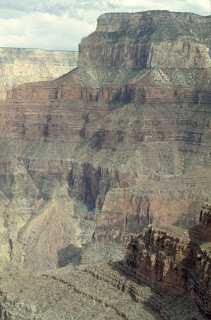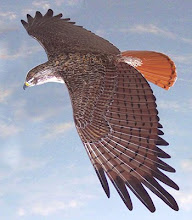So I Struggle On Sidewise
Natalie Merchant: The Man in the Wilderness
We run a short distance this morning, and go into camp,
to make oars and repair boats
and barometers. The walls of the canyon have been steadily increasing in altitude to this point, and now they are more than two thousand feet high. In many places, they are vertical from the water's edge; in others, there is
a talus between the river and the foot of the cliffs, and they are often broken down by side canyons. It is probable that the river is nearly as low now as it is ever found. High water mark can be observed forty, fifty, sixty, or a hundred feet above its present stage. Sometimes logs and driftwood are seen wedged into the crevice overhead, where floods have carried them.
About ten o'clock, Bradley, Howland, Hall, and myself start up a side canyon to the east.
We soon come to pools of water; then to a brook, which is lost in the sands below; and passing up the brook, we find the canyon narrows, the walls close in, are often overhanging, and at last we find ourselves in a vast amphitheater, with a pool of deep, clear, cold water on the bottom. At first, our way seems cut off; but we soon discover a little shelf, along which we climb, and, passing beyond the pool, walk a hundred yards or more, turn to the right, and find ourselves in another dome-shaped amphitheater. There is a winding cleft at the top, reaching out to the country above,
nearly two thousand feet overhead. The rounded, basin-shaped bottom is filled with water to the foot of the walls. There is no shelf by which we can pass around the foot. If we swim across, we meet with a face of rock hundreds of feet high, over which a little rill glides, and it will be impossible to climb.
So we can go no farther up this canyon. then we turn back, and examine the walls on either side carefully, to discover, if possible, some way of climbing out. In this search every man takes his own course, and we are scattered.
I almost abandon the idea of getting out, and am engaged in searching for fossils, when I discover, on the north, a broken place, up which it may be possible
for me to climb.
The way, for a distance, is up a slide of rocks; then up an irregular amphitheater, on points that form steps and give hand-hold, and then I reach a little shelf, along which i walk, and discover a vertical fissure, parallel to the face of the wall, and reaching to a higher shelf. This fissure is narrow, and I try to climb up to the bench, which is about forty feet overhead. I have a barometer on my back, which rather impedes my climbing. The walls of the fissure are of smooth limestone offering neither foot- nor hand-hold. So I support myself by pressing my back against one wall and my knees against the other, and, in this way, lift my body, in a shuffling manner, a few inches at a time, until I have, perhaps, made twenty-five feet of the distance, when the crevice widens a little, and I cannot press my knees against rocks in front with sufficient power to give me support in lifting my body, and I try to go back. This I cannot do without falling. So I struggle along sidewise, farther into the crevice, where it narrows. But by this time my muscles are exhausted, and I cannot climb longer; so I move still a little farther into the crevice, where it is so narrow and wedging that I can lie in it, and there I rest.
Five or ten minutes of this relief, and up once more I go, and reach the bench above. On this I can walk for a quarter of a mile, till I come to a place where the wall is again broken down, so that I can climb up still farther, and in an hour I reach the summit. I hang up my barometer, to give it a few minutes time to settle, and occupy myself in collecting resin from the pinon pines, which are found in great abundance. One of the principal objects in making this climb was to get this resin, for the purpose of smearing our boats; but I have with me no means of carrying it down. The day is very hot, and my coat was left in camp, so I have no linings to tear out. Then it occurs to me to cut off the sleeve of my shirt, tie it up at one end, and in this little sack I collect about a gallon of pitch. After taking observations for altitude, I wander back on the rock, for an hour or two, when suddenly I notice that a storm is coming from the south. I seek a shelter in the rocks; but when the storm bursts, it comes down as a flood from the heavens, not with gentle drops at first, slowly increasing in quantity, but as if suddenly poured out. I am thoroughly drenched, and almost washed away.It lasts not more than half an hour, when the clouds sweep by to the north, and I have sunshine again.
In the meantime, I have discovered a better way of getting down, and I start for camp, making the greatest haste possible. On reaching
the bottom of the side canyon,
I find a thousand streams rolling down the cliffs on every side, carrying with them red sand; and these all unite in the canyon below, in one great stream of red mud.
Traveling as fast as I can run,
I soon reach the foot of the stream, for the rain did not reach the lower end of the canyon, and the water is running down a dry bed of sand; and although it comes in waves, several feet high and fifteen or twenty feet in width, the sands soak it up, and it is lost. But wave follows wave, and rolls along, and is swallowed up; and still the floods come on from above. I find that I
can travel faster than the stream; so I hasten to camp, and tell the men there is a river coming down the canyon. We carry our camp equipage hastily from the bank, to where we think it will be above the water.
Then we stand by, and see the river roll on to join the Colorado.
Great quantities of gypsum are found at the bottom of the gorge;
so we name it Gypsum Canyon.
--John Wesley Powell
journal entry for July 26, 1869











<< Home